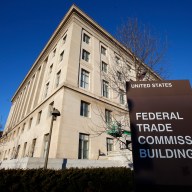TORONTO – Fears that a suffocating debt crisis could choke the life out of the world’s delicate economic recovery battered the world’s stock markets Thursday, sending the loonie plunging along with the price of oil, gold and other commodities.
Mounting evidence that the world economy is slowing, along with a fresh economic warning from the U.S. central bank, stoked concerns a second recession could be on the horizon, just two years after the end of the last major downturn.
In Washington, the head of the International Monetary Fund Christine Lagarde warned that the global economy is facing serious risks unless governments can deal with growing debt problems in Europe and the United States.
“The current economic situation is entering a dangerous phase,” Lagarde told a news conference kicking off the annual meetings of the IMF and its sister lending organization, the World Bank.
Economists and other observers say the risk of a second recession is mounting.
“The probability of going back into recession is higher now than at any point in the recovery,” said Tim Quinlan, an economist at the Wells Fargo bank in the United States.
He put the odds of a so-called double-dip recession — one economic downturn followed by another — at 35 per cent, the highest yet.
“I still think a double-dip recession for the world’s major economies is unlikely, but my confidence in that belief is being eroded daily,” said World Bank president Robert Zoellick, warning that the world remained in a “danger zone.”
At the heart of the trouble is a crippling government debt crisis in Europe that shows no sign of being settled and could sink the economies of Greece, Italy, Spain and Portugal.
Investors, consumers and governments are also worried a similar debt time bomb is ticking in the United States and could explode any hopes of a lasting recovery in the world’s biggest economy.
“The uncertainty arising from the escalating sovereign debt crisis has reached a threatening level,” economist Christoph Weil warned in a note to investors Thursday.
In Ottawa, Finance Minister Jim Flaherty warned of a second financial meltdown on the scale of 2008 if action is not taken to deal with the debt crisis. The minister issued an alarm hours before flying to Washington to meet with his G20 colleagues in an 11th-hour effort to avert a crisis.
If the issue of a Greek default is not dealt with, “I think matters will come to a head, quite frankly,” he said outside the Commons.
“We’ll run into the kind of crisis situation that we ran into in October 2008, so one wants to get ahead of the issue rather than react to another crisis.”
Meanwhile, Prime Minister Stephen Harper and the leaders of Australia, Indonesia, Mexico, Korea and the United Kingdom have sent an open letter to French President Nicolas Sarkozy, the G20 chairman, calling for strong action at the November Cannes Summit to help ensure global economic stability and growth.
While the debt fears are squeezing the global economy and eroding consumer confidence, many of the world’s companies are making record profits after years of restructuring and layoffs.
That means corporate Canada and the private sector in other parts of the world are much better able to handle another downturn, said a Canadian bank CEO.
“This crisis is really with sovereign debt and it’s with the governments,” Rick Waugh, chief executive of the Bank of Nova Scotia, told the BNN business channel.
“The world doesn’t come to an end. The private sector is much better able to cope with it — not that we’re immune to it.”
In Canada and internationally, economic indicators were mostly negative Thursday.
The loonie tumbled more than two cents US cents in trading as a gloomy assessment of the American economy sent commodity prices reeling and currency traders running to the safe haven status of the U.S. dollar.
The Toronto and New York stock markets also plunged nearly 400 points each at the close, continuing the wave of volatility seen for the last two months.
The market losses wiped out tens of billions of dollars in the value of Canadians’ investments in everything from mutual funds to stocks held in pension plans.
The steep decline in global markets followed an assessment Wednesday from the U.S. Federal Reserve that there are “significant downside risks to the economic outlook.”
“Confidence was already shaky, at best, and the Fed’s words only heightened worries about the outlook,” said Benjamin Reitzes, an analyst at BMO Capital Markets.
Canadian retail sales fell more than expected in July in a broad-based retreat led by auto dealers, who had benefited from unusually robust activity in the previous month. Statistics Canada said the drop was the biggest since April, 2010.
The price of oil fell more than six per cent, more than $5.41 a barrel, to US$80.51, its lowest level in a month. The selling reflected concerns that world demand for oil would fall if the economy slows.
If sustained, the oil price drop is good news for consumers because it will lower gasoline prices. But it will hurt Canada’s oil-producing provinces — Alberta, Saskatchewan and Newfoundland — and could threaten some energy projects.
Gold fell $66.40, or 3.7 per cent, to finish at US$1,741.70 an ounce. Silver, a precious metal that has wider demand for industrial production, plummeted $3.89, or 9.6 per cent, to $36.58.
In Germany, the European Commission’s index of consumer optimism fell to a two-year low of minus 18.5 in September in the 17 countries that use the euro.
Meanwhile industrial orders — key for Europe’s manufacturing driven economy — slid 2.1 per cent in July, according to Eurostat, the EU’s statistics office.
British, European and Asian markets all spiralled downwards as investors brushed off the U.S. Federal Reserve’s efforts to spur growth and focused instead on the central bank’s gloomy outlook.
France’s CAC-40 was down a hefty 5.3 per cent while Germany’s DAX slid five per cent. The FTSE index of Britain’s leading shares ended down 4.7 per cent.
In Asia, Japan’s Nikkei 225 dropped 2.1 per cent. South Korea’s Kospi slid 2.9 per cent. Australia’s S&P/ASX 200 was 2.6 per cent down. Hong Kong’s Hang Seng saw the biggest fall, diving over 900 points, or 4.9 per cent.
















